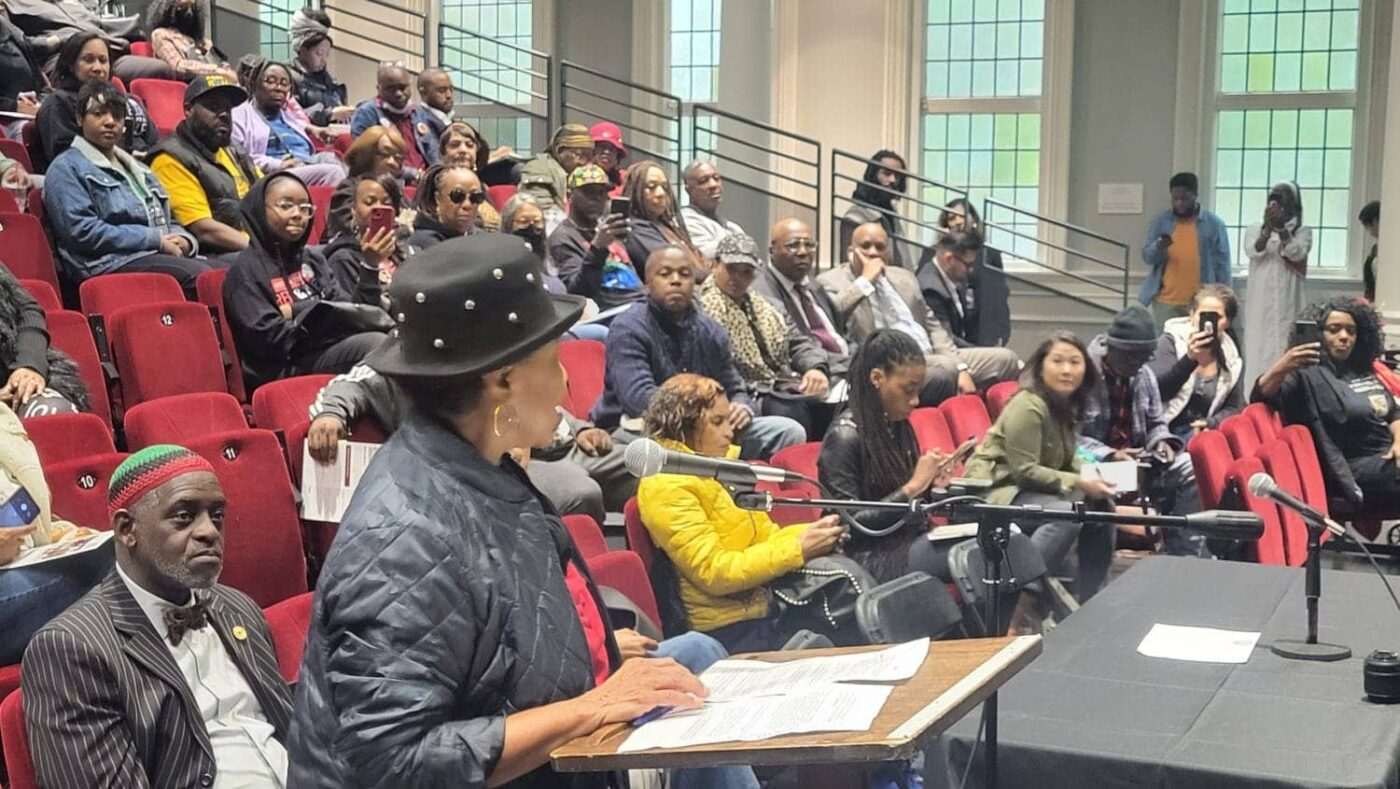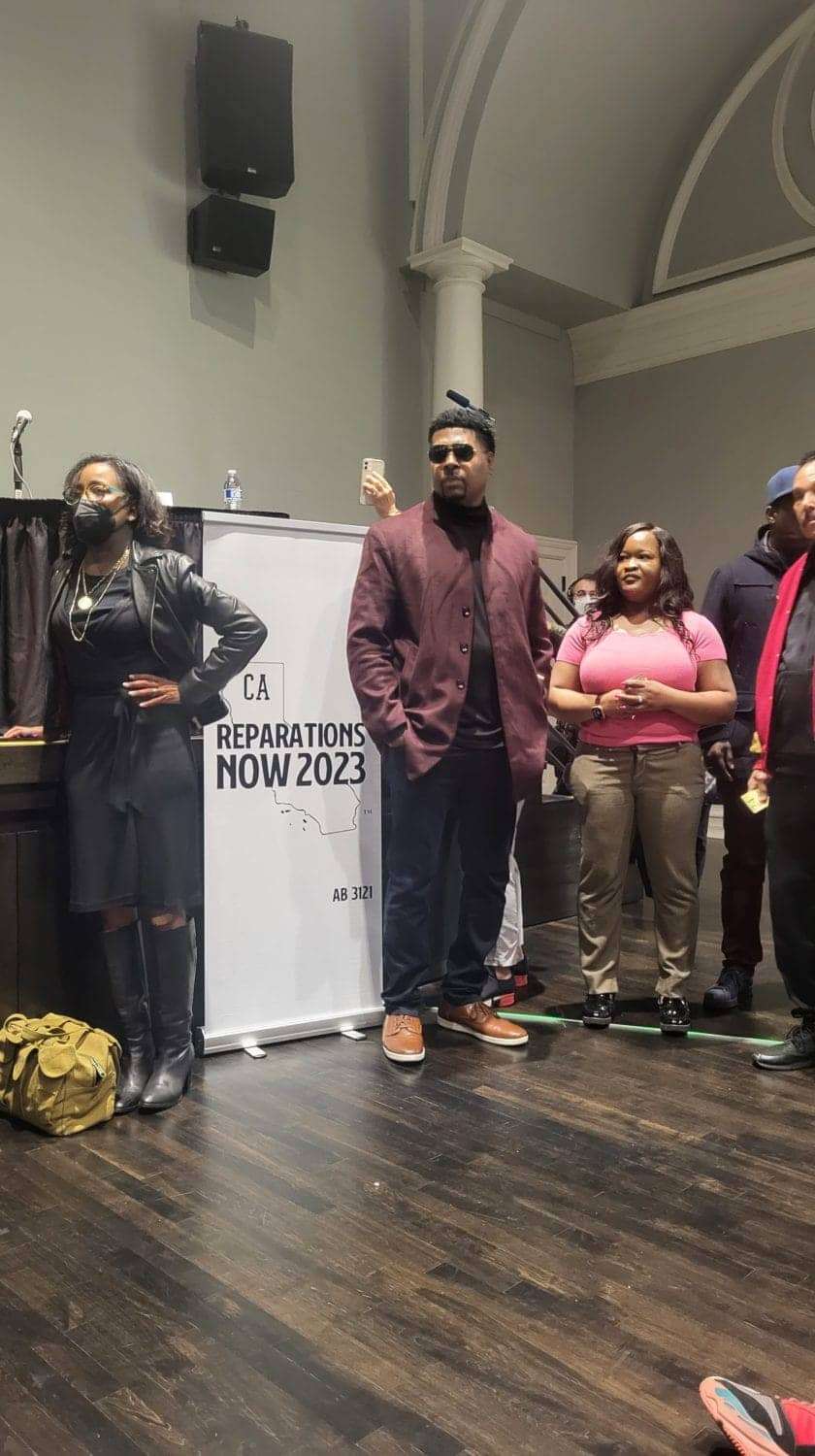
Caption:
By Lee Hubbard
A heated California Reparations task force meeting took place this past Saturday at Mills College in Oakland. The meeting, one of several that have taken place over the past year and a half, was open to two minutes of public comment on the phone and in person.
“We need to lift up our ancestors as we stand on their shoulders,” said U.S. Congresswoman Barbara Lee, who represents the district where the meeting was held. “Reparations is not a luxury, as it is a debt owed, and the 40 acres and a mule promise has yet to be fulfilled.”
The California Reparations Task Force was set up to study slavery and its after effects on Black people in California. It was also set up to develop proposals to remedy the effects of slavery and Black disfranchisement, through policy changes and even possible cash payments.
This task force was approved by Governor Gavin Newsom in 2020 and the task force was assembled. The final recommendations from the task force, which were approved this past Saturday, will be submitted to the California Legislature, who will decide to vote on the matter. If passed by the legislature, Governor Newsom will have the option to sign the bill, granting Black reparations.
One of the main issues, who would receive reparations, kept on being affirmed, by the various speakers who came from all over the state to speak in Oakland. Reparations should be lineage based and it should only be given to the descendants of American slavery.
“Reparations should be lineage based,” said Tariq Nasheed, the award winning filmmaker and Black activist. “The problem is we see a lot of trick bag language being mixed into it and it opens the door for others to come in and undermine us.
Reparations should be lineage based compensation. It is not compensation for racism.”
Reparations is a controversial issue, as some Black people see it as a way to remedy the enslavement Black people experienced in America, as well as suffering of close to 100 years of Jim Crow policies, which treated Blacks as second class citizens, up into the late 1960s.
Others feel that Black people do not deserve reparations for something that happened years ago, even though the remnants of slavery still exist.
According to a poll by the Pew Research Center, three-quarters of Black adults (77%) say Black descendants of enslaved people in the U.S. should be repaid in cash or money, while 18% of White Americans say the same. There are 2.6 million African Americans in California, making up six percent of the state population. The cost of reparations has ranged. Some economists state it could cost the state more than $800 Billion.
In San Francisco, a local reparations task force set up by the San Francisco Board of Supervisors, gave a proposal to the board, which stated that Black residents of San Francisco should be given paid compensation for injustices in San Francisco. They proposed that supervisors should either give Black residents annual incomes of $97,000 for 25 years, tax forgiveness, selling homes for $1 to Black San Francisco residents and giving cash payments of $5 million for every single eligible Black adult.
The California reparations task force mentioned things such as monetary payments, land and or tax forgiveness. A payment of 1.2 million per every Black California resident that qualifies has been floated around. The payments would be based on the time spent in California and harms committed against them.
Morris Griffin from Los Angeles came to the hearing. He said that Black residents of California, who qualify, should be given a monthly payment of $5,000 a month instead of a big cash settlement, as a form for compensation for the descendants of slavery.
“This will help Black people, as we are at the bottom, and it will also help to stimulate the economy,” said Griffin. “This payment will take place until one has passed.”
Gloria Berry from San Francisco came to be heard. A member of the San Francisco Reparations Task Force, said she is for a cash payment, but more needs to be done.
“We also need to improve the schools to stop the prison-to-pipeline phenomena,” said Berry. “There is a lot that needs to be done.”
During the call-in portion of the public comment, the meeting got heated, as a person in the crowd, called in from a cell phone and began talking on the phone and then to the crowd. As the talk got heated, members of the crowd yelled out “we need reparations, redlining is happening right now.” Minutes later, California Task Chairman Kamillah Moore, had the members removed from the auditorium.
Some believe that since California was a free state that slavery didn’t exist in the state. But others disagree.

“There was informal slavery here,” continued Nasheed at the hearing. “The only reason they made it a technicality to legally own slavery in California. They didn’t want the white wealthy slave owners back east to come out here and buyup all the prime real estate.”
He said they had slave colonies in San Bernardino and various parts of Northern California.
“We couldn’t get out of slavery because they made it illegal for Black people to testify against white people,” continued Nasheed.
The task force meeting lasted until 5 o’clock as the members debated about technical issues. The next meeting will be in Sacramento, before the task forces deadline, where its recommendations have to be turned in by July 1, to the state legislature and the Governor.
“We want to get enlightenment, engagement and we want to get people involved in this process,” said Dr. Amos Brown, who is the Vice Chairman of the California Reparations Task Force. “We can have a wish list, but it has to be practical to get things done.”
Lee Hubbard is a Bay Area journalist who earned his master’s degree in journalism at Northeastern University. Well known to longtime Bay View readers, he can be reached at superle@sbcglobal.net.





